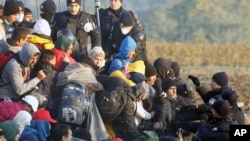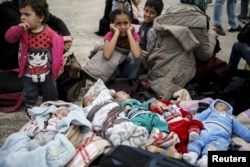The European Commission chief has called an emergency meeting of EU and Balkan leaders as the crowds of migrants fleeing the Middle East and Africa continue to flood into the western Balkans.
Jean-Claude Juncker said there is a need for greater cooperation among the nations dealing with the migrant crisis.
He said he has invited the heads of state of 10 countries, including non-European Union members Macedonia and Serbia, to meet Sunday in Brussels to strategize.
Officials from the U.N. refugee agency have also been invited to attend.
Thousands seek asylum
Thousands of asylum-seekers have entered Slovenia since Saturday, forcing the country to deal with a surge of migration on its southern border.
Slovenian authorities said that at least 4,000 migrants, including many babies and young children, arrived Tuesday from Croatia in addition to about 8,000 migrants who arrived Monday.
Slovenian President Borut Pahor said that additional police will be sent to the border with Croatia and that he is ready to approve the deployment of the Slovenian army to cope with the large influx of migrants.
After meeting with top European Union officials (European Council President Donald Tusk and Juncker) in Brussels, Pahor said border police help and financial aid to deal with the crisis could also be approved if it is requested.
Speaking to reporters in Ljubljana earlier in the day, Slovenia Interior Minister Bostjan Sefic said the army's power would be limited and it would not have police authority and “everything would be led by the Slovenian police.”
Border 'barriers'
Sefic said that his government is not ruling out the possibility of safeguarding the border crossing “with physical barriers.”
Slovenia, a tiny country of 2.2 million people, has also appealed for help from the European Union to cope with the stream of migrants and refugees arriving from Croatia since Hungary closed its border late Friday.
Most of the people who have inundated the Balkan countries are fleeing war and poverty in the Middle East, Africa and Asia and are trying to find a way to reach Germany, Sweden or other prosperous countries of Western Europe that are more sympathetic to asylum-seekers.


